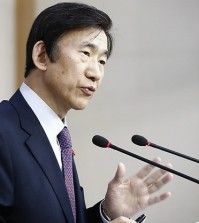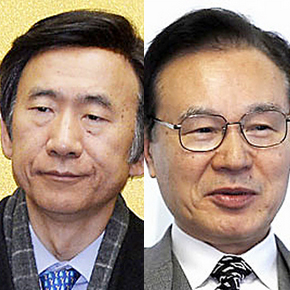- California Assembly OKs highest minimum wage in nation
- S. Korea unveils first graphic cigarette warnings
- US joins with South Korea, Japan in bid to deter North Korea
- LPGA golfer Chun In-gee finally back in action
- S. Korea won’t be top seed in final World Cup qualification round
- US men’s soccer misses 2nd straight Olympics
- US back on track in qualifying with 4-0 win over Guatemala
- High-intensity workout injuries spawn cottage industry
- CDC expands range of Zika mosquitoes into parts of Northeast
- Who knew? ‘The Walking Dead’ is helping families connect
Global partnerships for cyberspace boosted in Seoul
By Kim Tae-gyu
Representatives from 87 nations adopted the “Seoul Frameworks and Commitments” on ground rules dealing with issues in the cyber world during the 2013 Seoul Conference on Cyberspace, which ended its two-day run Friday.
Foreign Minister Yun Byung-se announced this chairman’s summary, which stressed the necessity of global cooperation in coping with both the opportunities and threats posed by interconnected societies.
The delegates then picked the Netherlands as the host of the fourth annual gathering next year.
“Participants agreed to make efforts to enable more people to have access to broadband Internet so that the world economy will become more integrated,” Yun said.
“They also reached the consensus that they will come up with measures to promote cyber security, which continues to gain weight, based on cooperation between the private and public sectors and sharing best practices.”
With regard to cybercrime, he said the delegates will enhance partnerships to nurture capabilities in cracking down on it without compromising the private lives and freedom of individuals.
They also promised to protect major communications infrastructure while accepting the premise that international regulations including the United Nations Charter should be applied to cyberspace.
“In order to ensure the openness of the Internet, freedom of expression should be safeguarded. The Internet should be managed transparently and democratically,” Yun said.
“In addition, exchanges between cultures should be activated to promote an information society.”
The Seoul conference, the third of its kind following previous events in London in 2011 and Budapest last year, chalked up a set of tangible results such as the frameworks and commitments.
Unlike previous conferences, the Seoul forum brought not only developed countries but also emerging economies to the table.
Previous chairmen, the U.K.’s Foreign Secretary William Hague and Hungarian Foreign Minister Janos Martonyi praised the successful hosting of the third annual gathering.
Hague said that Korea was the perfect place to host the cyberspace forum in light of its competitiveness in information technology and Internet culture.
“This is a country that has produced some of the world’s most iconic technology brands, from Samsung laptops to LG handsets, which are revolutionizing the way we live,” Hague said in a meeting with officials of British companies here.
“You have created the world’s most connected society; with an average Internet speed that is four times faster than much of the developed world.”













